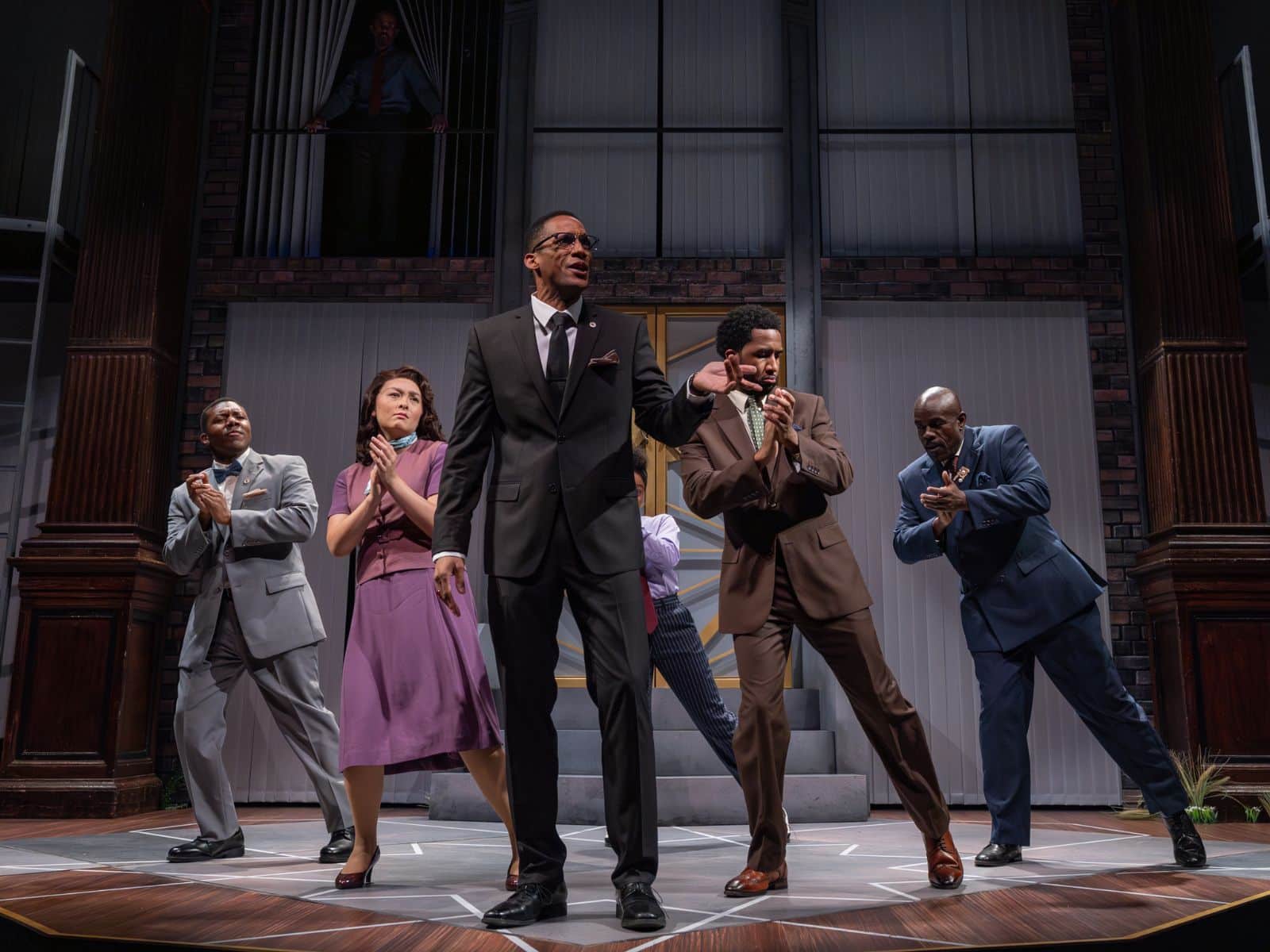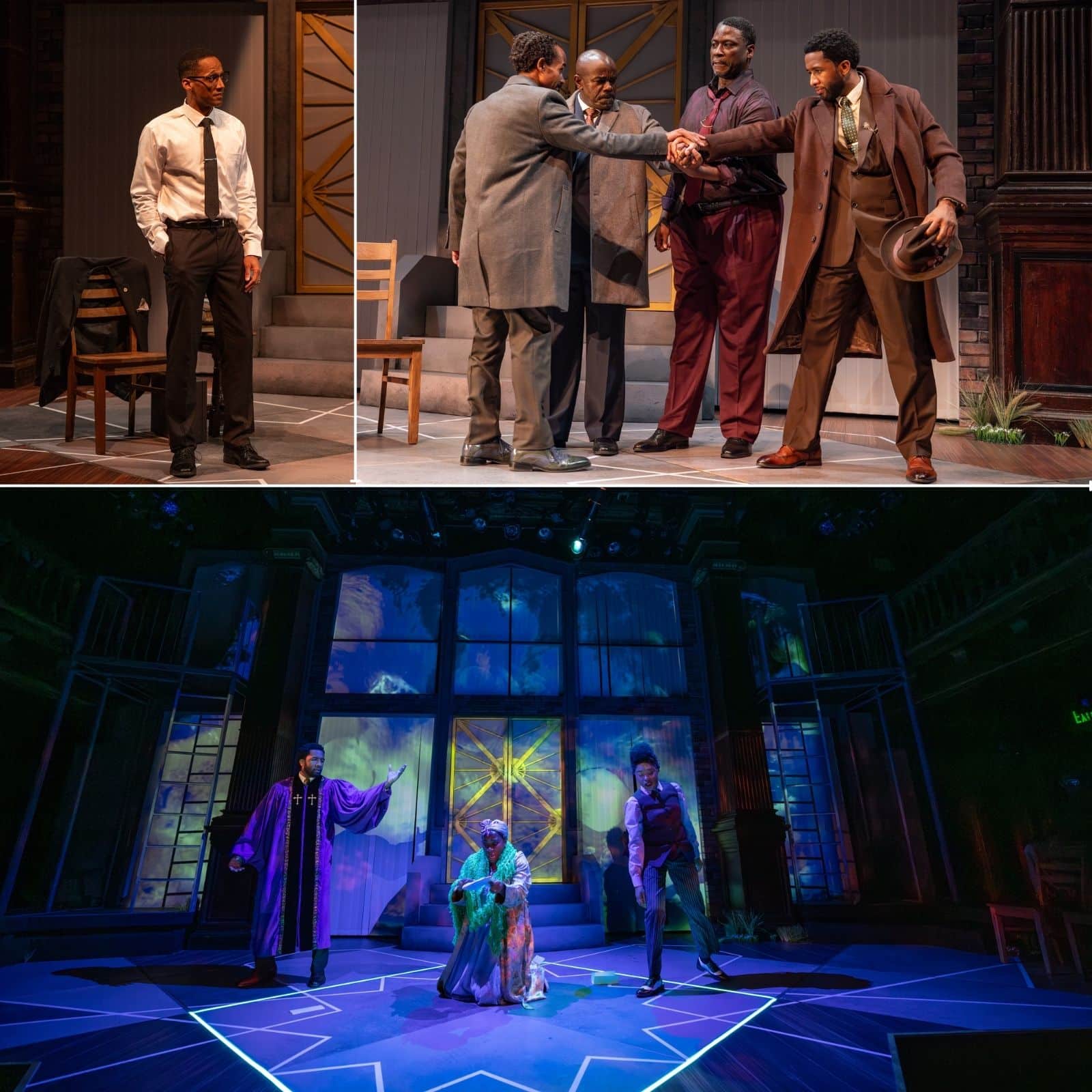What is the cost of honor? The price of freedom? The responsibility of ambition? From a fictionalized 1960s Harlem, Julius X: A Re-envisioning of The Tragedy of Julius Caesar by William Shakespeare combines the story arc of Julius Caesar with the assassination of Malcolm X and the poetry of today to evocatively plumb the uncertain depths of honor, loyalty, and brotherhood.
Neither a true Shakespearean adaptation nor a historical biography, this bold work reimagines the final days of Malcolm X as a fusion of classical tragedy and Civil Rights era loss. The play opens to reveal that Julius X has risen too quickly and wields too much influence for many in the Nation of Islam (referred to throughout as “the Nation”), sowing division among even his closest allies. It is an uncertainty that quickly grows into fear and tips over the edge into betrayal. One that ultimately costs Julius his life while also cementing his legacy of freedom and justice.

Al Letson’s script seamlessly blends spoken word with rhythm, music, slang, and verse to bring two worlds together — parallel yet separate across culture and time — creating something essential. Opening Folger Theatre’s season, mere months after the 100th anniversary of Malcolm X’s birth, Julius X invites the audience to bear witness and to take part in the struggle for equality and the dream of a better tomorrow.
Returning from a pilgrimage to Mecca with a clear vision of this better tomorrow, Julius X, played by Brandon Carter, carries the weight of legacy and story. Carter’s performance balances Julius’ singular determination with unwavering belief in the common good, even as threats rise. With a thoughtful smile and warm embrace, Carter fully embodies the charisma of both Malcolm X and Julius Caesar. Carter’s Julius shepherds his followers and the audience before him, through the mounting pressures of secession from the Nation by any means necessary — even if that means his death.
Cassius, played by Jay Frisby, uses insecurity and doubt as fuel to stoke the fires of destruction, hoping to prevent Julius’ vision from being realized. Drawn to power but too small to wield it, Frisby’s Cassius is a calculating man with self-aggrandizing aspirations and glitteringly dangerous eyes — luring bigger men to his purpose under the guise of duty and honor.
Caught at the center of this conspiratorial web is Brutus, played by Greg Alverez Reid. A towering man with a deep voice and deeper conscience, Reid artfully unravels as the bloody choice to assassinate Julius X is made. Deftly expressing Brutus’ moral agony, Reid allows audiences to viscerally feel the friction between his deep love for Julius and the nauseating cost of duty, which is corrupted by his bloody hands.

Equally loyal and plagued by grief but on the opposing side, Marc Anthony, played by Jonathan Del Palmer, personifies consequence and vengeance throughout the production. With sharp words and soft shoulders, Del Palmer’s Marc Antony stirs the hearts of his fellow Harlemites toward collective liberation and fiery action.
Swept up in this storm of heartbreak and sacrifice were Calpurnia, played by Nikkole Salter, and Portia, played by Renee Elizabeth Wilson. Wives to Julius X and Brutus respectively, the two lay bare the heavy emotional cost of the fight for justice in a world that granted them neither power nor security. Salter’s Calpurnia displays regal stoicism and tender grace, while Wilson’s Portia flames bright with passion and alarm.
Circling the story’s events were Cinna (and Black Soothsayer) played by Gaelyn D. Smith, Addara played by Lilli Hokama, Octavius (and Marullus) played by Shawn Sebastian Naar, and Casca (and Flavius) played by Dwayne Alistair Thomas. Together, these four gave further dimension to the swirl of loyalty, dissent, drama, emotion, fear, and belief that frayed the once-solid community at center stage — be it through wail, dance, chant, or mere presence.
These top-notch performances are all made possible by the finely-tuned work of a spectacular creative team. Direction by Nicole Brewer and choreography by Shawn Short opened up space for the characters and audience alike to fully participate in the story, inviting all to jump heart-first into questions of dignity and justice. Scenic design by Jonathan Dahm Robertson seamlessly melds the halls of Rome with the heart of Harlem, centered around the cultural dais of the front stoop. Projection design by Andrés Poch produced a transporting tapestry of textures, movement, and morality.
Thom J. Woodward’s sound design fully immerses the audience into a lively surround sound of questions, chaos, and sorrow. Lighting design by Porsche McGovern cleverly uses color and intensity — from flickering streetlights overhead to fractured gashes of light on the stage floor — to guide the story from camaraderie to vengeance. Similarly, costume design by Danielle Preston skillfully walked the line between 1960s America and the internal turmoil of each character, both (d)evolving as the tragedy unfolds.
With searing clarity and contagious courage, Julius X: A Re-envisioning of The Tragedy of Julius Caesar by William Shakespeare at Folger Theatre is a production that magnifies collective struggles and unearths individual conflict within two parallel tragedies while making a wholly new story for our times.Amid today’s continuing calls for and threats against justice, Julius X is a critical reminder of the power of community, the cost of fear, and the necessity of action to make our wor(l)ds whole.
Running Time: Two hours with a 15-minute intermission.
Julius X: A Re-envisioning of The Tragedy of Julius Caesar by William Shakespeare plays through October 26, 2025, at the Folger Theatre in the Folger Shakespeare Library, 201 East Capitol Street SE, Washington, DC. Accessible performances and related programming will be offered throughout the run of the production and are listed on the show page. Tickets ($20–$90) are available online, by calling the Folger Box Office at (202) 544-7077, or through TodayTix.
Credits for the cast and creative team are online here.
Julius X: A Re-envisioning of The Tragedy of Julius Caesar by William Shakespeare
By Al Letson
Directed by Nicole Brewer
Children under the age of 4 are not permitted.
SEE ALSO:
Brandon Carter on Malcolm X and playing ‘Julius X’ at Folger (interview by Andrew Walker White, September 17, 2025)
Folger Theatre announces cast and creative team for ‘Julius X’ (news story, August 26, 2025)



